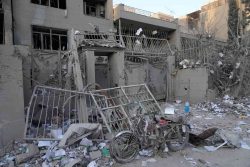13:45 JST, November 30, 2020
A second wave of the novel coronavirus has been rampant in Europe. The European Union must maintain unity and implement its recovery fund early to help the economy recover.
Moves to lock down cities involving such steps as restricting outings of people and limiting business operations are spreading across Europe. In France, the daily number of new infection cases exceeded 80,000 in early November, but lockdown measures are said to have been effective in reducing the figure to the 20,000 level.
Such measures are unavoidable to curb the spread of infections and prevent the medical systems from collapsing, but it is obvious they intensify the blow to the economy.
The recovery fund agreed to by EU leaders during summit talks in July is on the scale of 93 trillion yen and has been viewed as a trump card for rebuilding the bloc’s economy next year and beyond. The fund will be managed together with the EU’s budget for 2021-27 and used particularly for member states hit hard by the pandemic.
However, a conflict has surfaced in the EU recently, raising the possibility that the implementation of the fund will be delayed. This is a serious situation. At issue is whether to establish a system that will allow the EU to block funding from the recovery fund to countries that do not adhere to the bloc’s fundamental principle of the rule of law.
Eastern European countries Poland and Hungary rejected the recovery fund plan, claiming that such a system could infringe on the sovereignty of member states. Germany, which currently holds the rotating EU presidency, is likely to be tested on its ability to coordinate to bridge the divide during a summit in December.
Behind this conflict is a rift in the EU over values such as democracy and human rights.
In Poland, the independence of the judiciary is at risk, as the government has intervened in the selection of judges, for example. In Hungary, pressure has increased on media critical of the government.
The European Commission, the EU’s executive body, has repeatedly warned the two countries, but the situation has not improved.
Many member states support the mechanism that will set adherence to the rule of law as a condition for funding. This seems to be a sign of their distrust toward the two countries. There was a similar split in the EU over the acceptance of refugees from the Middle East and Africa.
Poland and Hungary should take the criticism seriously. They must change their hard-line stance and not treat the recovery fund as a hostage.
The fund is ambitious as it intends to not only implement health and economic measures to counter the pandemic, but also to promote investment in coping with climate change to bring about economic growth. On environmental issues, EU member states also need to be aligned.
The EU’s presence is likely to be determined on whether the bloc can lead international efforts in concert with the United States.
(From The Yomiuri Shimbun, Nov. 30, 2020)
Top Articles in Editorial & Columns
-

Riku-Ryu Pair Wins Gold Medal: Their Strong Bond Leads to Major Comeback Victory
-

Reciprocal Tariffs Ruled Illegal: Judiciary Would Not Tolerate President’s High-Handed Approach
-

China Provoked Takaichi into Risky Move of Dissolving House of Representatives, But It’s a Gamble She Just Might Win
-

Japan’s Plan for Investment in U.S.: Aim for Mutual Development by Ensuring Profitability
-

Flu Cases Surging Again: Infection Can Also Be Prevented by Humidifying Indoor Spaces
JN ACCESS RANKING
-

Producer Behind Pop Group XG Arrested for Cocaine Possession
-

Japan PM Takaichi’s Cabinet Resigns en Masse
-

Man Infected with Measles Reportedly Dined at Restaurant in Tokyo Station
-

Israeli Ambassador to Japan Speaks about Japan’s Role in the Reconstruction of Gaza
-

Videos Plagiarized, Reposted with False Subtitles Claiming ‘Ryukyu Belongs to China’; Anti-China False Information Also Posted in Japan


















